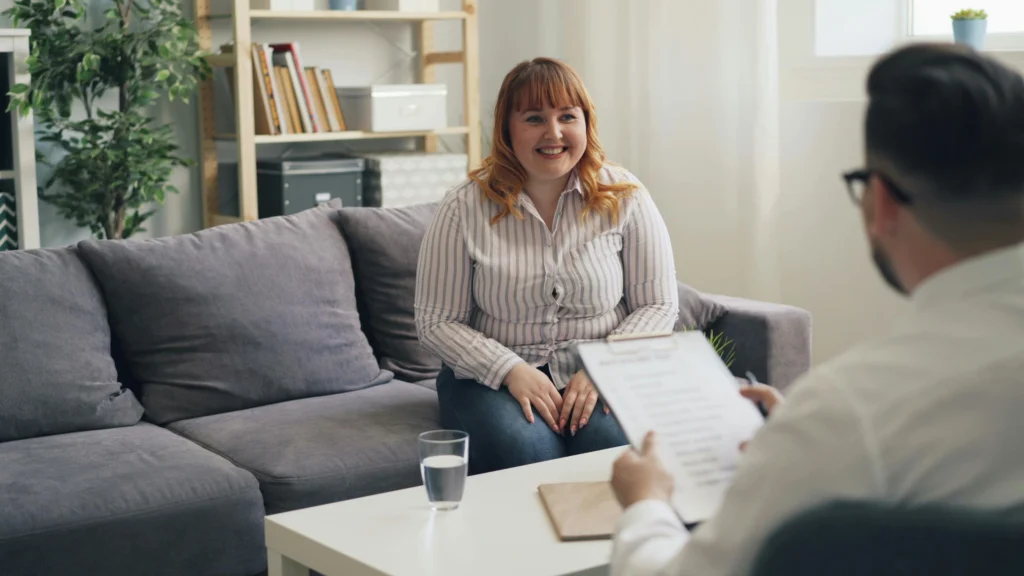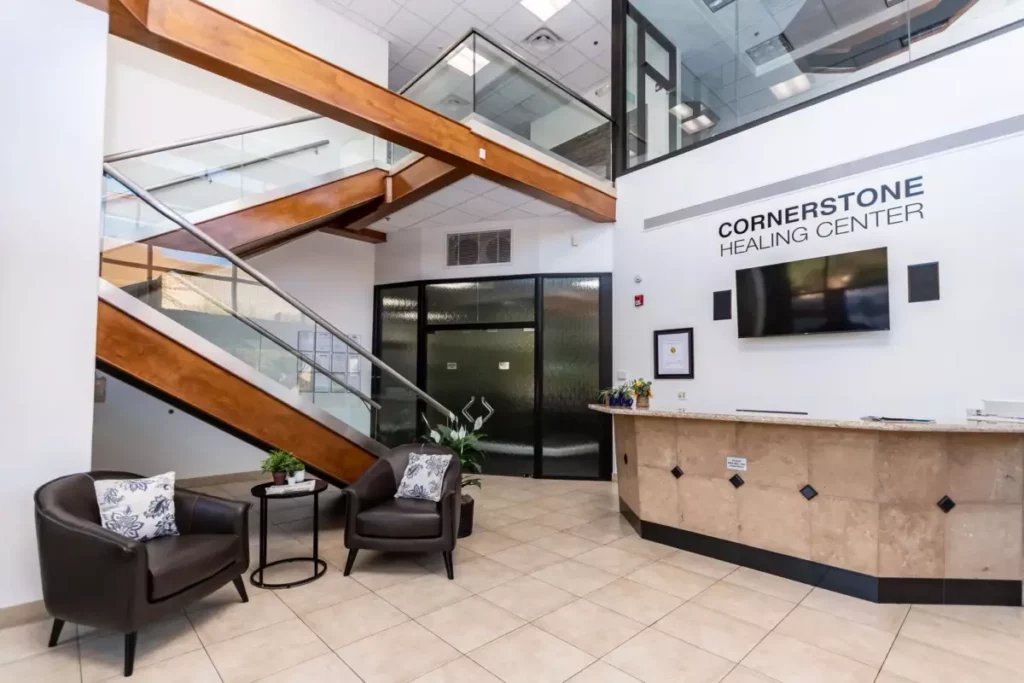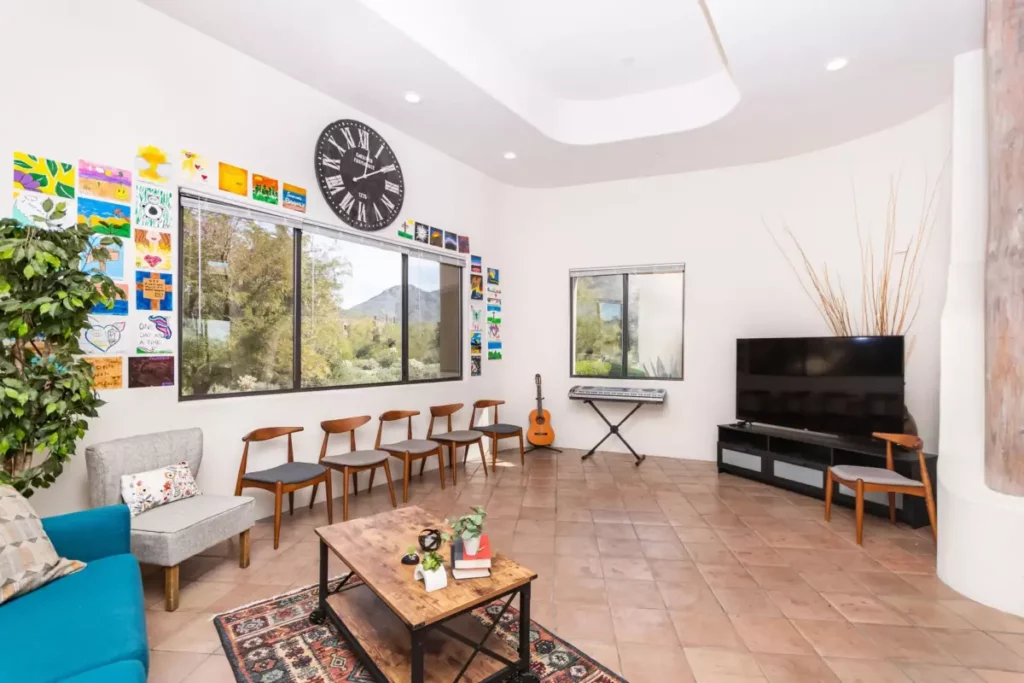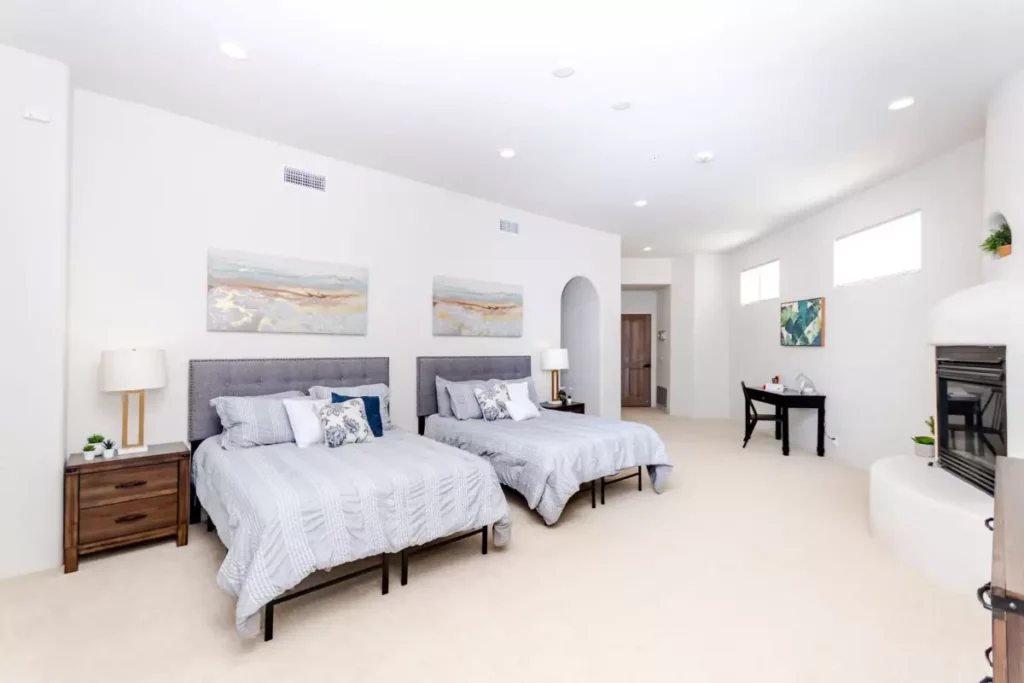Anxiety Treatment
Anxiety can feel overwhelming, which is why our team of professional and compassionate therapists are here to help you.
Begin your insurance verification today
We accept most insurances
Now accepting AHCCCS Plans, TriCare, and TriWest

Our Anxiety Treatment in Scottsdale, Arizona
At Cornerstone, we understand how difficult it can be to live with anxiety and anxiety disorders. With us, you’re not alone; we’ll gently and respectfully guide you through your healing journey so you can live an anxiety-free tomorrow.
Anxiety disorders are not just occasional worries or stress. They are chronic conditions that take different forms, including Generalized Anxiety, Panic Disorder, and Social Anxiety. These disorders can cause physical symptoms such as heart palpitations and insomnia, severely affecting daily life. Unlike typical Anxiety, these disorders can be overwhelming and often coexist with other mental health issues, such as depression.
Understanding Anxiety Disorders
What is an Anxiety Disorder?
What Does Anxiety Feel Like?
Risk Factors
Diagnosing Anxiety Disorders
Anxiety disorders are a group of mental health conditions characterized by excessive and persistent fear, worry, and anxiety that are disproportionate to the actual danger or threat. These disorders can significantly impact an individual’s ability to function in daily life. Unlike the normal anxiety, anxiety disorders are relentless and can grow worse without treatment. They include various types, such as generalized anxiety disorder, panic disorder, social anxiety disorder, and specific phobias.
Each type has its unique symptoms but shares the common feature of excessive, difficult-to-control Anxiety. These conditions are often accompanied by physical symptoms like heart palpitations, sweating, and trembling.
Anxiety can feel overwhelming and different for each person. For some, it can feel like a tightness in your chest and racing thoughts, while others may experience lightheadedness and irritability.
Common symptoms include:
- A racing heart or shortness of breath
- Tight chest
- Dizziness,
- Sweating
- Feeling lightheaded
- Trembling
- Constant worrying or racing thoughts
- Feeling impending doom
- Fear
- Irritability
- Helplessness or heeling overwhelmed
- Avoidance
- Difficulty focusing
Anxiety symptoms can vary from mild to intense, and it can interfere with your daily life. Seeking help and support can make a big difference in managing your anxiety.
Some people are more prone to experience anxiety and anxiety disorders than others. Various factors, including genetics, can influence these conditions. Brain chemistry abnormalities and certain personality traits, such as perfectionism or low-stress tolerance, also play significant roles.
Experiences of trauma, especially in childhood, and chronic stress from various life circumstances can trigger these disorders. Concurrent mental health conditions like depression can exacerbate its effects. Additionally, substance abuse and chronic illness can both cause and worsen symptoms.
Additionally, major life changes and societal pressures can act as catalysts, making understanding these risk factors vital for early detection and support.
Diagnosing anxiety disorders is a careful process conducted by qualified healthcare professionals like psychiatrists or psychologists. The Diagnostic and Statistical Manual of Mental Disorders, Fifth Edition (DSM-5), provides specific criteria for diagnosing these conditions. According to the DSM-5, key features include excessive anxiety and worry occurring more days than not for at least six months about various activities.
Your anxiety should be challenging to control and associated with three or more symptoms: (in adults), such as restlessness, fatigue, difficulty concentrating, irritability, muscle tension, or sleep disturbance.
At Cornerstone, we use the DSM-5 to carefully document your symptoms to provide you with proper diagnosis and care.
Our Anxiety Treatment Programs

Residential & Inpatient Programs
Our residential programs for anxiety provide around-the-clock care in a safe, supportive environment. With a mix of therapy, medication, and holistic approaches, this immersive program helps you address the core issues behind your anxiety and develop lasting coping skills for long-term recovery.

Outpatient Programs
Our outpatient treatment for anxiety provides flexible, part-time care, enabling individuals to focus on recovery while keeping up with daily responsibilities. With therapy, medication management, and supportive services, we guide you through your symptoms and recovery journey.

Virtual IOP
Our Virtual Intensive Outpatient Program (IOP) for anxiety offers comprehensive, convenient support from the comfort of home. With individual therapy, group counseling, and secure online resources, it’s a great option for those who need flexible care but want the full support of a structured program.

Cognitive Behavioral Therapy
Cognitive Behavioral Therapy is a highly effective treatment for Anxiety Disorders. It involves identifying and challenging negative thought patterns and behaviors to alter unwanted anxious thoughts.

Medication Management
Medication management is often used in conjunction with therapy. Medications like anti-depressants and anti-anxiety drugs can help regulate brain chemistry and alleviate symptoms.

Holistic Therapies
We emphasize holistic therapies that address the mind, body, and spirit. This can include mindfulness practices, yoga, and nutritional counseling. These practices help you to manage emotions and reduce stress. By focusing on being present without judgment, you can gain tools to create a strong foundation for recovery.






















Our Scottsdale Behavioral Health Center
Cornerstone has a Behavioral Health Center treatment located in Scottsdale that offers lifesaving mental health treatment services. The environment we create for you promotes healing and focus while also ensuring your comfort. We have group and learning rooms that provide space for collective therapy sessions and educational workshops.
We have individual therapy rooms that provide privacy and comfort for one-on-one sessions, allowing our clients to work with their therapists on resolving personal issues. You have access to a large fitness facility as well.
At Cornerstone Healing Center, we are committed to delivering a holistic approach to mental health treatment, blending comfort, therapy, and personal development for a full experience.
Our Treatments for Anxiety Disorders
Our Arizona Behavioral Health Center is designed to provide a supportive and safe space so you can heal at your own pace.
Integrative Recovery Approach
We address the physical, mental, and emotional sides of recovery, with a deep understanding of your anxiety and triggers.
Dedication Clinical Team
Through counseling, we offer a confidential space to explore the root causes of your anxiety, empowering you to build resilience and confidence on your recovery journey.
Comprehensive Care
Our anxiety treatment programs provide continuous, caring support tailored to your unique needs.
Broad Treatment Options
From intensive support to flexible options, our treatment programs are designed to meet you wherever you are in your journey to recovery.
What to Expect
- An assessment of your individual needs and goals to create a personalized addiction rehabilitation plan.
- A treatment plan for mental health or co-occurring (or dual diagnosis) behavioral health conditions.
- Evidence-based therapies include cognitive behavioral therapy, dialectical behavior therapy, and trauma-informed care.
- Holistic approaches include yoga, meditation, art therapy, and music therapy
- Nutrition counseling and physical fitness activities for overall health and wellness.
- Family involvement in the recovery process through Common Ground or family sessions.
- Aftercare planning that includes relapse prevention strategies for long-term success in sobriety.
Client Family Testimonial
Meet Our Treatment Team
Meet our experienced masters-level treatment professionals passionately dedicated to providing compassionate, expert care in our state-of-the-art rehabilitation facilities and recovery centers.
Clinical Director of Scottsdale Program
Eboni Fields, MS LPC
Eboni Fields, MS LPC, is a seasoned Clinical Director who brings over a decade of experience in behavioral health and substance abuse. She is a licensed professional counselor with a Masters in Mental Health Counseling from Grand Canyon University.
More About EboniClinical Director of Phoenix Program
Nate Bush, LCSW
Nate began his recovery journey in 2010 and earned a Master's in Social Work from ASU. He’s been in the Behavioral Health field since 2013. Specializing in CBT, DBT, and grief, Nate is now the Clinical Director of our Phoenix program, underlined by his passion for helping others who struggled with substance abuse issues as he did.
More About NateWhen is inpatient or residential treatment appropriate for anxiety?
Inpatient or residential treatment becomes a necessary step when anxiety disorders severely impact daily functioning or pose a risk to the individual’s safety. This level of care is suitable if symptoms are intense, persistent, and unresponsive to outpatient treatments.
Inpatient treatment offers a structured environment, intensive therapy, and continuous support, crucial for those struggling with severe Anxiety. It’s a space where individuals can focus entirely on recovery, away from daily stressors.
Do you accept my insurance for your anxiety treatments?
Most likely, yes! Cornerstone accepts most major insurances. To be sure, you can fill out our commitment-free form to verify your coverage.
What level of care is needed to treat anxiety?
The level of care for treating anxiety disorders varies based on the severity and impact of the symptoms. Mild to moderate anxiety often responds well to outpatient therapy, like cognitive behavioral therapy and medication management. More severe cases, especially those involving other mental health issues or substance abuse, may require intensive outpatient programs or inpatient care. It’s essential to consult with a mental health professional to determine the most effective approach for your specific situation.
How can I support a loved one with anxiety?
Supporting an anxious loved one involves understanding, patience, and encouragement. Listen actively without judgment and offer reassurance. Encourage them to seek professional help and, if willing, accompany them to appointments. Educate yourself about Anxiety disorders to better understand their experiences. Above all, ensure they know they’re not alone in their journey and their feelings are valid and acknowledged. Remember, your support can be a vital part of their path to recovery.
Let's begin the journey together
Frequently Asked Questions
Get Started Now
Call and speak with one of our caring team members about help for you or a loved one.

